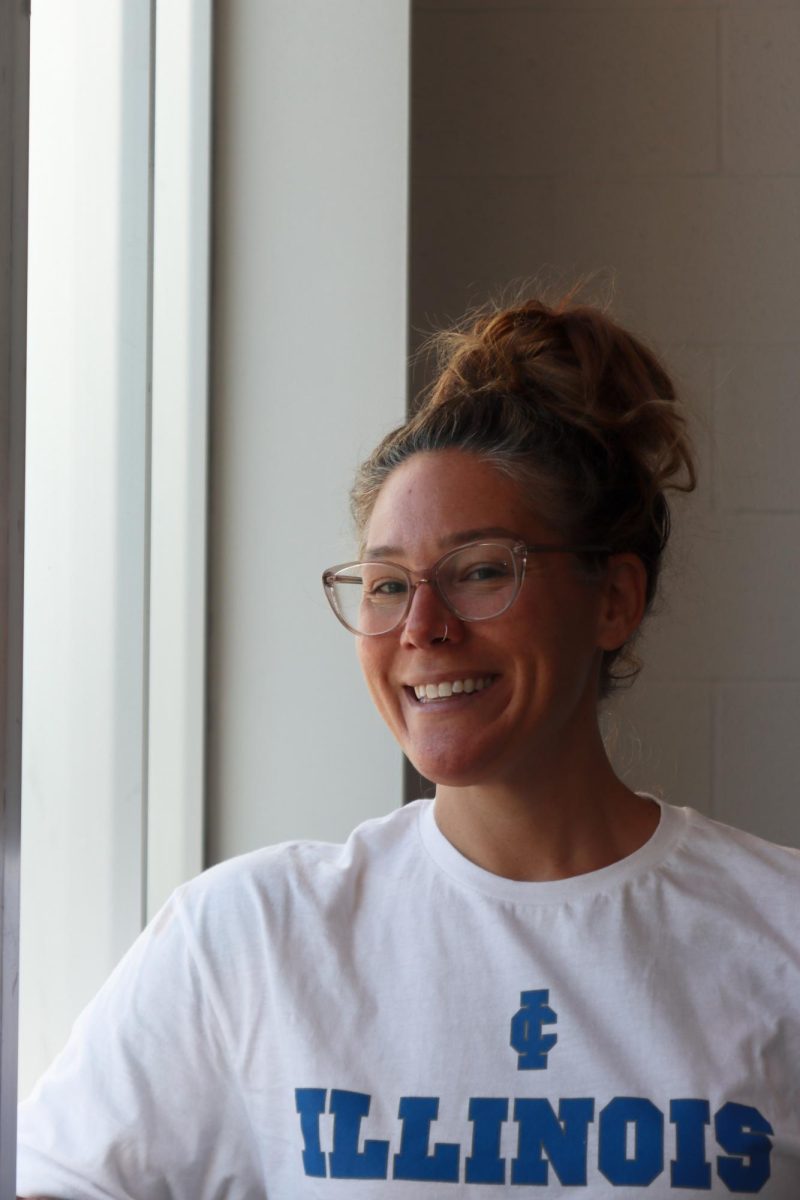Erin Kloster was hanging up her son’s senior basketball banner near the end of last year when an administrator walked up to her and made a proposition.
“They said, ‘Hey, you want to teach APUSH?’ and I said, ‘Absolutely not,’ and I moved on with my life,” Ms. Kloster said.
She was approached as the possible solution to an overflow problem. One teacher alone could no longer accommodate the growing number of EHS students signing up for AP United States History.
Ms. Kloster didn’t initially want to be that solution.
“Number one, because APUSH is huge; it’s hard. Second, because this is [Keith] Baker’s stage,” she said.
But she was the ideal candidate. On top of having taught various social sciences throughout her decade-long career, she indicated her status as a new faculty member at EHS that year as a factor that might’ve made her desirable. She already had College Board experience from instructing AP Psychology as well.
So, a week later, they asked again.
“…an administrator said, ‘We really think that you should teach APUSH. We really want you to teach APUSH. Will you do it?’ and I said yes … I’ll do it,” Ms. Kloster said.
Inside, she was panicking.
As the fall semester approached, that panic was compounded by a disastrous AP Summer Institute in Kentucky.
“I was looking forward to it because, usually, at summer institutes you learn a lot about how to teach AP,” Ms. Kloster said.
But the instructor assigned to her session walked in late every day, opened slideshows he appeared to have never seen before and forgot to send them to lunch and snack breaks.
“He made grown adults popcorn read articles,” she said. “One morning he told a teacher from another session that he had no idea what he was going to do that day. The teacher thought he was taking the course, not leading it.”
Halfway through the week, he was reported and removed. Luckily, there were seasoned AP teachers there who gave Ms. Kloster materials and guidance, and she emphasized the constant support she received from her department back home.
“I started freaking out again and texted Mr. Baker and I said, ‘This is not going well. I’m going to need more help.’ And of course, he said, ‘I have whatever you need. I’ve got you.’ Then, I felt a little bit better. It’s been a rollercoaster.”
On Aug. 16, Ms. Kloster’s first day teaching the course, she felt “nauseous.” Neither her nor her students knew what to expect.
“I had heard she was relaxed, but I didn’t know if it would change with APUSH,” said Libby Strahm, a junior in Ms. Kloster’s fourth hour.
But both parties became more optimistic as the day progressed. Strahm noted the teacher’s welcoming aura and how she made everyone feel important.
“No one threw anything at me, no one ran out screaming and everyone’s returned, so I think it’s okay,” Ms. Kloster said.
Still, she feels immense pressure.
“It’s just such a huge class. It’s a lot of information; it’s a lot of reading; it’s a lot of studying. I mean, it’s all of American history,” she said. “So, I have that on top of [the fact that] some of these students are expecting Mr. Baker and they know their schedule doesn’t say Mr. Baker and they don’t know me.”
Mr. Baker’s notoriety is a huge and undeniable circumstance of becoming an APUSH teacher at EHS, one that Ms. Kloster is deeply conscious of.
“APUSH is Mr. Baker,” she said.
But now, only five out of seven sections of APUSH are Mr. Baker, and everyone involved is grappling with what that means.
Junior Reagan Siron remembers looking at her schedule for the first time.
“I was a little disappointed that I didn’t have Mr. Baker, and I didn’t know who Ms. Kloster was, so I was also a bit confused but excited for the possibilities,” she said.
Per Ms. Kloster, there is no animosity between the two instructors. She said that she and her sister have “… just kind of [gotten] along” with Mr. Baker since they observed in his classroom while they were student teaching.
“He actually told me we were friends, so we are friends,” she said. “Let the record show: he said we’re friends!”
Mr. Baker remarked that Ms. Kloster is “killing it” already, and that the administration chose the right person.
“She’s been assigned the impossible and she’s doing a great job,” he said. “I remember my first year doing this, and she’s doing a lot better than I did.”
Amid all the pressures, Ms. Kloster really does love teaching history, and is eager to see how the feedback, statistics and new methods she receives from College Board will elevate all her classes, not just APUSH.
“I like learning about people and the decisions that people make, and how those decisions are connected to everything else that happened throughout history,” she said. “I specifically like little known voices in history, like, marginalized groups of people.”
Overall, she is striving to make her classroom a place where students feel comfortable being inquisitive and being wrong, where they feel accepted unconditionally.
“I’m thinking, like, a cohesive bond that we’re all going through the trenches of AP together, and we’re going to help each other along the whole way through,” she said.


